Jon Brooks • • 7 min read
Stoicism Deconstructed: Visual Breakdowns of 5 Ancient Cheat Codes For Unshakeable Confidence and Tranquility

This article explores the first 5 chapters of an iconic Stoicism text: The Enchiridion by Epictetus. You’ll find below visual breakdowns of his wisdom as well as audio recordings that take a deeper dive.
🔘 The Dichotomy of Control
Chapter 1 / 53
“We are responsible for some things, while there are others for which we cannot be held responsible. The former include our judgement, our impulse, our desire, aversion and our mental faculties in general; the latter include the body, material possessions, our reputation, status – in a word, anything not in our power to control.”— Epictetus, Enchiridion, Chapter I
I/ Understanding the Dichotomy of Control
In Your Control
There are some things that are within your control, that are up to you, that you are responsible for, and it is wise to spend your energy trying to change these things.
These things include:
- Your Judgment
- Your Impulses
- Your Desires
- Your Aversions
- Your Mental Faculties
Not In Your Control
There are some things that are not within your control, that are not up to you, which you are not responsible for, and it is foolish to spend energy trying to change these things.
These things include:
- Your body
- Your possessions
- Your reputation
II/ Conceptualising the Dichotomy of Control
What’s in our control is unconstrained by externals, and what is outside our control is constrained by externals.
On the left side of the circle, you will see things in your control. This is where we act from as a Stoic. We are not blind to the right side of the circle, but we always place it second to the left side.
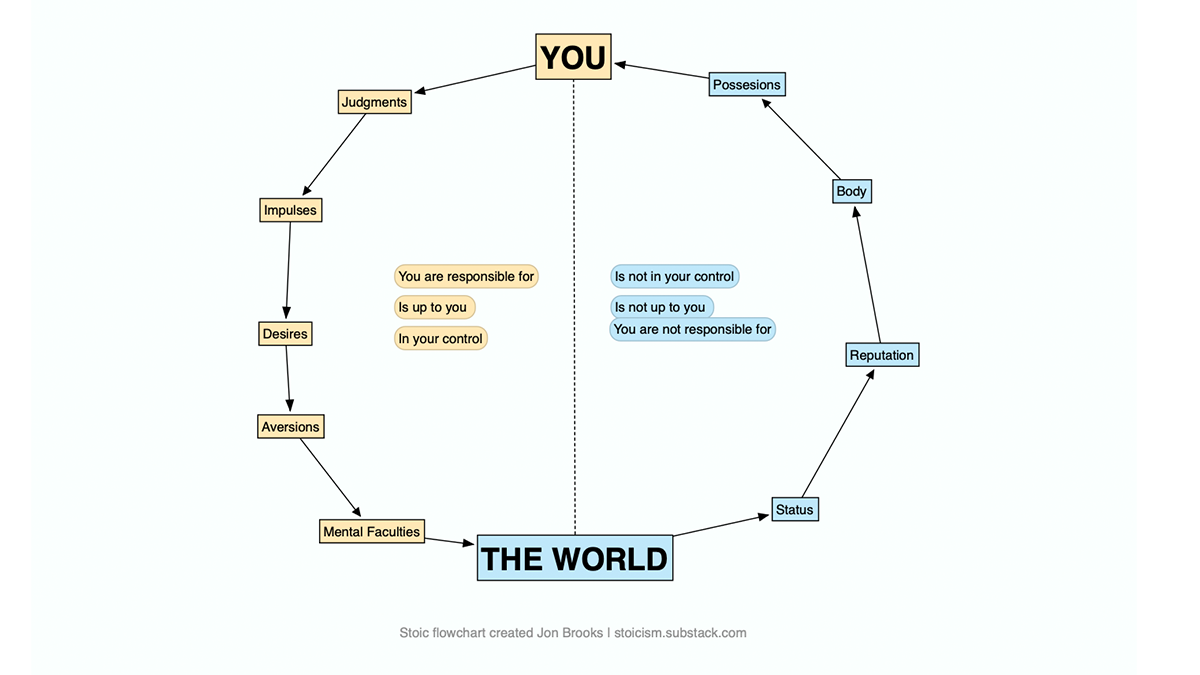
III/ The Benefits of Practicing the Dichotomy of Control
If you truly embody this practice by understanding what belongs to you and is up to and what does not, here’s what you can expect:
- You will feel liberated and free.
- You will not have any hatred or resentment in your heart.
- Every single thing you do will be chosen by you.
- Nobody will have the power to hurt you.
IV/ Bringing The Right Intention to Practicing the Dichotomy of Control
If you want to receive the vast benefits that The Dichotomy of Control brings, you must practice it religiously. A fundamental life shift must occur if you wish to attain deep freedom and happiness.
V/ Practical Application of the Dichotomy of Control
Let’s look at how we can put these ideas into immediate practice.
Here is a diagram that shows the step-by-step process:
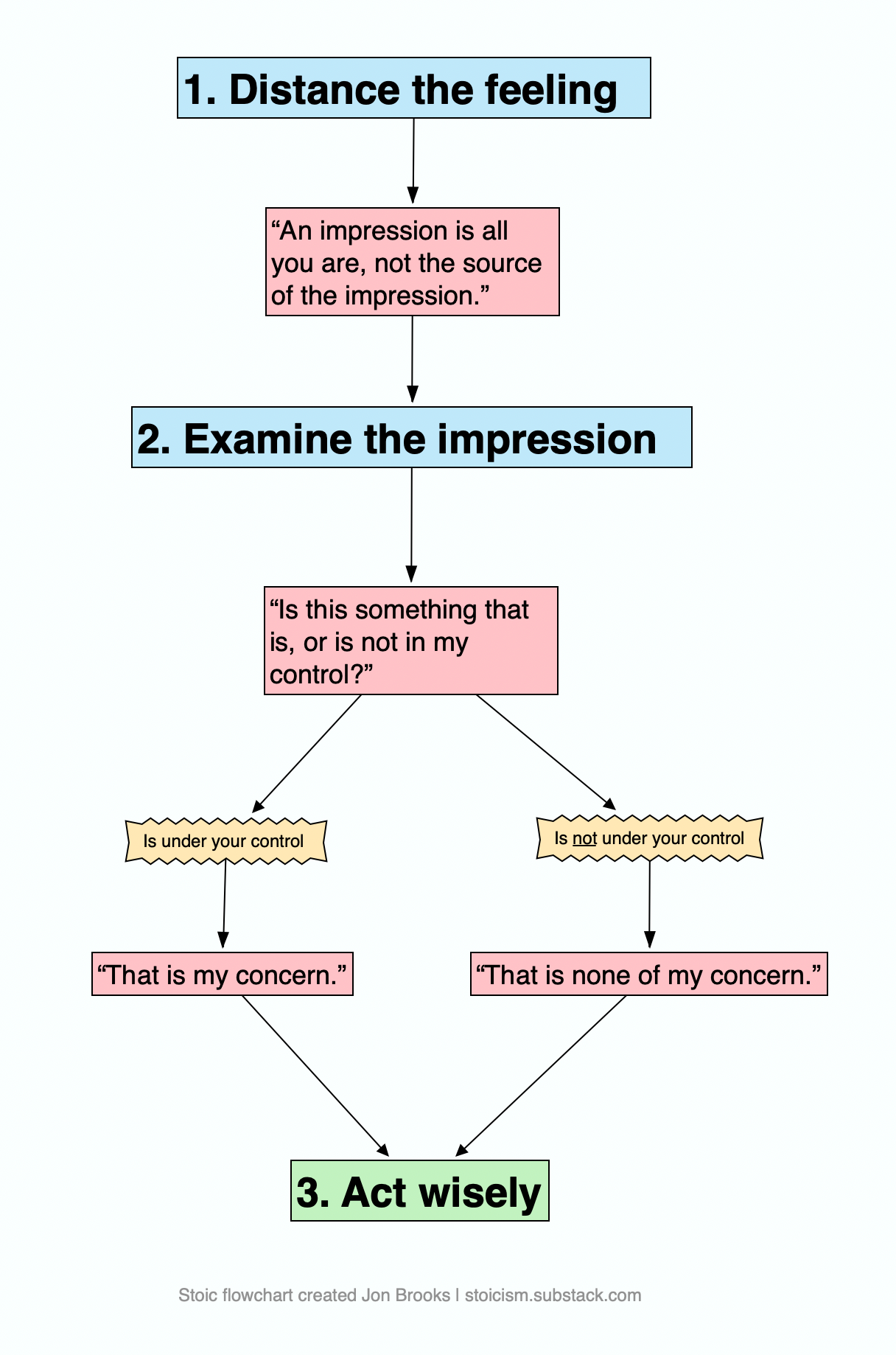
🎧 Dichotomy of Control Meditation:
🧁 Aversion and Desire
Chapter 2 / 53
“The faculty of desire purports to aim at securing what you want, while a version purports to shield you from what you don’t. If you fail in your desire, you are unfortunate, if you experience what you would rather avoid you are unhappy. So direct aversion only towards things that are under your control and alien to your nature, and you will not fall victim to any of the things that you dislike. But if your resentment is directed at illness, death or poverty, you are headed for disappointment.”— Epictetus, Enchiridion, Chapter II
I/ Desire and Aversion: Root of Suffering
There are some things that we desire to move toward and some things that we desire to move away from.

If we fail to get what we desire or we experience that which we want to avoid, we become miserable.

II/ Working With Aversion
As a starting point for working with aversion, we should only seek to avoid or change things that are within our control, which we saw in above, include our judgments, impulses, desires, aversions, and mental faculties—internal things.
Conversely, we should not seek to avoid things outside of our control, which would include our body, our material possessions, and our reputation—external things.
If you are desperate to avoid external misfortune such as illness, low status, and death you are setting yourself up for unhappiness. For such things out of our control, we would be well-advised to accept them and handle with wisdom.
If we want to live a happy life, the secret is to avoid thinking and acting poorly, and accept the world insofar as can’t control it, just as it is.
III/ Working With Desire
During your training to become a Stoic, drop desire to the fullest extent possible for the foreseeable future.
Desire is very powerful and can lead the untrained mind toward misery.
For now, do not fantasise about the things you want. Do not create a big wish list of material possessions and figure out clever plans to attain them. Just drop desire to the best of your abilities.
Instead, learn to desire what you already have and you will always be content.

📱Attachment to Possessions
Chapter 3 / 53
“In the case of particular things that delight you, or benefit you, or to which you have grown attached, remind yourself of what they are. Start with things of little value. If it is china you like, for instance, say, ‘I am fond of a piece of china.’ When it breaks, then you won’t be as disconcerted. When giving your wife or child a kiss, repeat to yourself, ‘I am kissing a mortal.’ Then you won’t be so distraught if they are taken from you.”— Epictetus, Enchiridion, Chapter III
I/ The Spell of Attachment
We very often delude ourselves about the true value of things.
If something makes us feel good or benefits us in some way, we put that thing on a pedestal.
When we put things on pedestals, it is easy to become attached.
When we are attached to things, our emotional well-being becomes linked to something beyond ourselves.
As a result, we suffer due to our fear losing that thing or suffer from actually losing that thing.
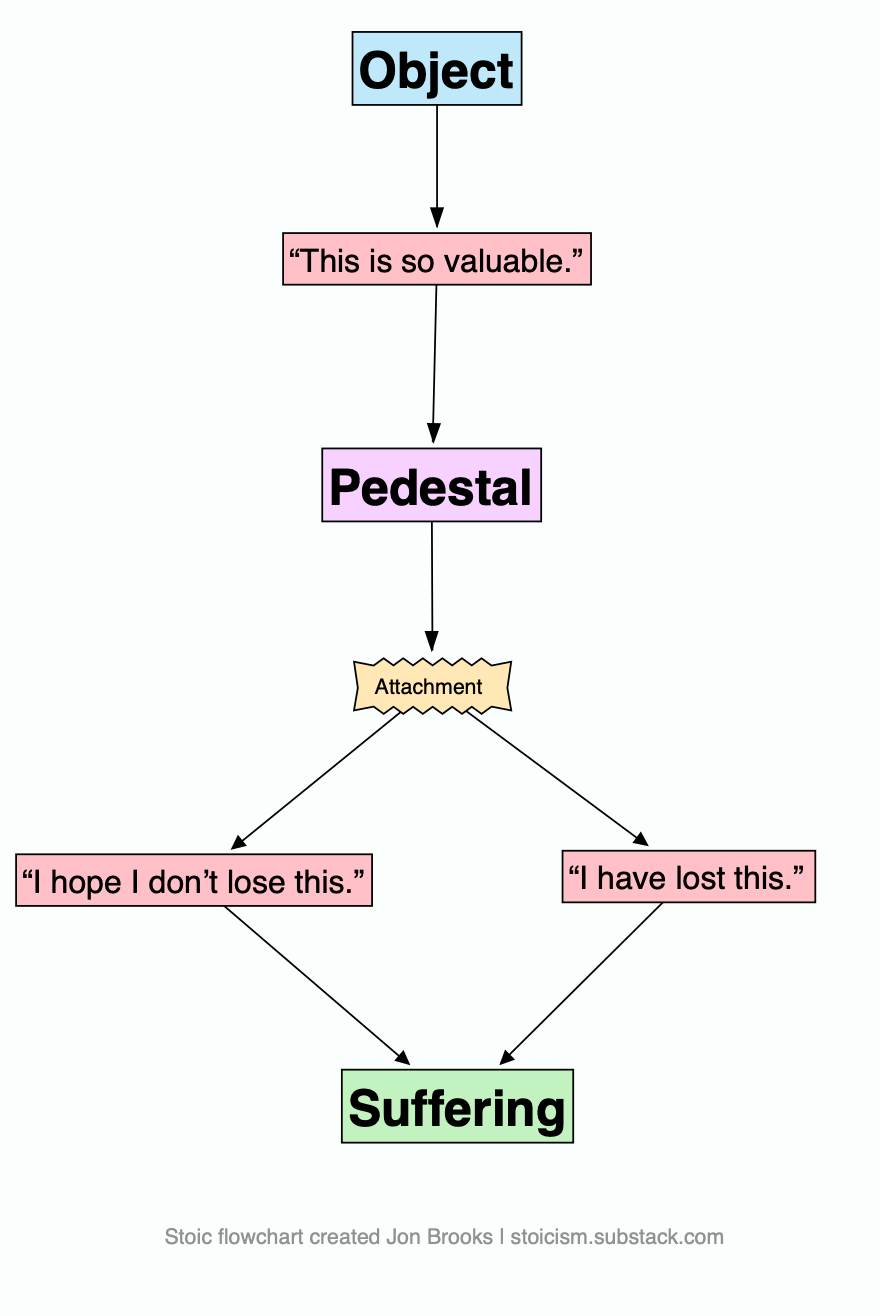
II/ Breaking The Spell
To free ourselves from this deluded attachment, and ultimately suffering, we can practice clear seeing of our attachments and our relationship to them.
If you have a very expensive handmade ornament in your home, you can remind yourself that in reality, “I am fond of a piece of china.”
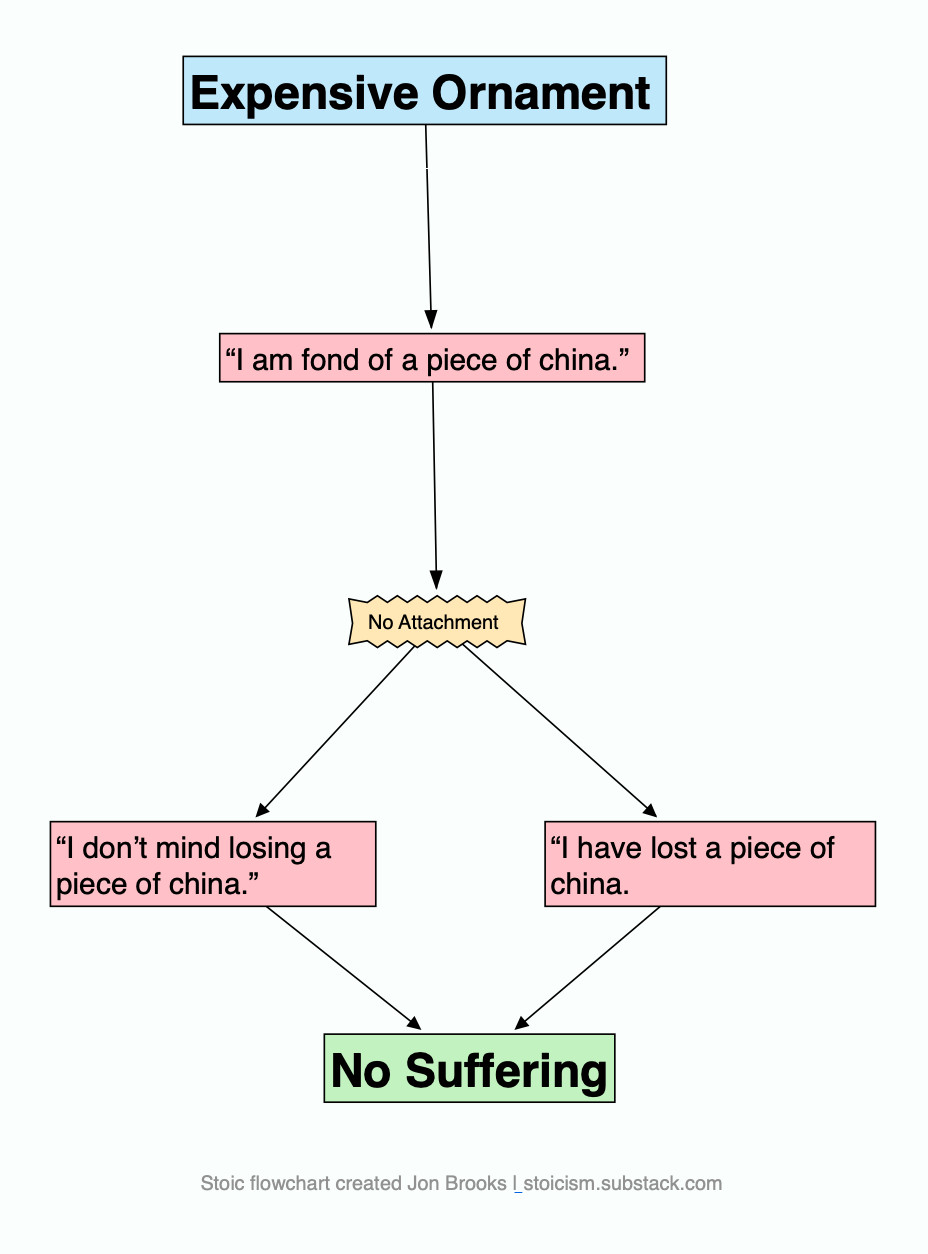
III/ How to Practice
Train your mind gradually.
Start with small things, and work your way up to the things you care most about in this life.
Break down the object into its simplest forms.
iPhone
Attached mind: My new iPhone is so powerful. The XDR, OLED, HDR screen is essentially magic.
Stoic mind: I am fond of a small block of metal, glass, and plastic that is in my pocket.

☀️ How to Make Plans
Chapter 4 / 53
Whenever planning an action, mentally rehearse what the plan entails. If you are heading out to bathe, picture to yourself the typical scene at the bathhouse – people splashing, pushing, yelling and pinching your clothes. You will complete the act with more composure if you say at the outset, ‘I want a bath, but at the same time I want to keep my will aligned with nature.’ Do it with every act.— Epictetus
Follow these steps whenever making plans:
I/ Rehearse Your Plan
When you plan to do something, before doing it, mentally rehearse what will happen.
Pay particular attention to the things that may threaten to disturb your peace of mind.
II/ Add Stoic Intention
After you have rehearsed the plan, say the following instruction to yourself:
I want to go through with this plan, but I also want to exercise reason and maintain my peace of mind. This will be impossible if I irrationally go to pieces every time something “unfavourable” happens.
III/ Make Stoic Intention Part of the Plan
Whenever we plan to do something, we must also plan to do that thing wisely.
So we always have two goals:
- Follow the plan
- Practice virtue while following the plan
If we always contemplate realistic expectations about the frustrating elements of the activity we plan to do, we will be prepared to meet that frustration with tranquility.
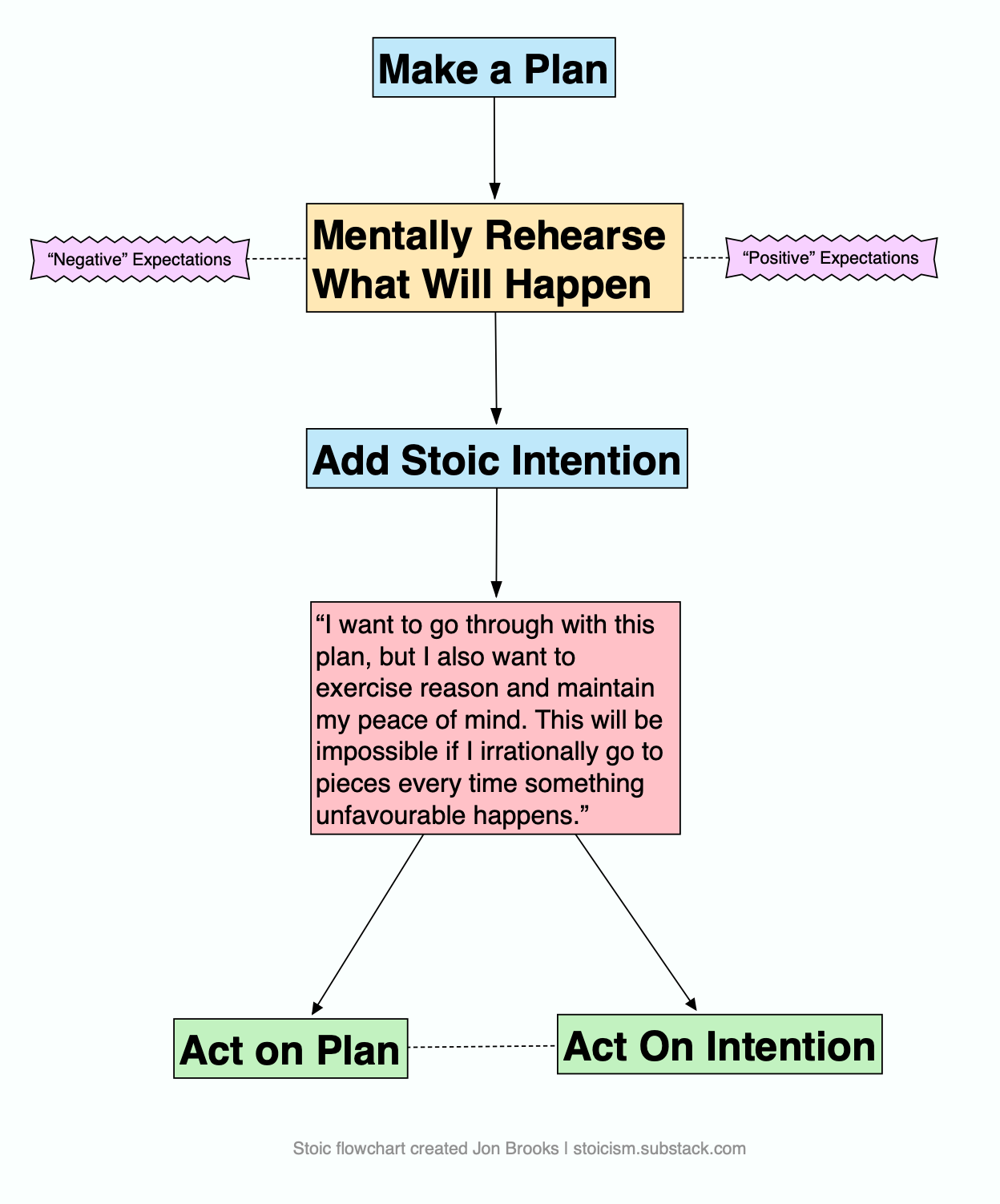
🎧 Stoic Meditation on Planning Your Day:
⛈ No Event is Disturbing or “Bad”
Chapter 5 / 53
It is not events that disturb people, it is their judgements concerning them. Death, for example, is nothing frightening, otherwise it would have frightened Socrates. But the judgement that death is frightening – now, that is something to be afraid of.— Epictetus
Whenever you have the knee-jerk reaction of labeling a situation “bad,” bring to mind the following rational Stoic perspective.
I/ The Causal Chain of Emotion
It is not accurate to say, “An event is disturbing or bad.”
Incorrect view:

Whenever someone gets upset, the cause is their judgement about the event, not the event itself.
Correct view:

For example, most people have a fear of death. But we see that the wisest people who ever lived, like Socrates, did not fear death.
This proves it’s our judgement about death that is scary, not the event of death itself.

The wise Stoic understands that unpleasant emotions are not caused by other people or the world, but instead it is their own judgments that disturb them.
II/ The 3 Levels of Wise Interpretation
- Ignorant person: Blames others and the world for their misery.
- Stoic-in-training: Blames oneself for his misery.
- The Wise Person: Never needs to blame themselves or others for his misery but examines and corrects their initial judgement.



🎧 Audio Lesson on How Stoics Interpret Reality:

Jon Brooks
Jon Brooks is a Stoicism teacher and, crucially, practitioner. His Stoic meditations have accumulated thousands of listens, and he has created his own Stoic training program for modern-day Stoics.








